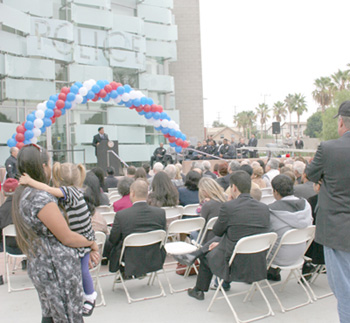
Family, friends, police and elected officials celebrated the renaming of the station and unveiled a marquee with the wording "Rudy De Leon Hollenbeck Police Station" on Oct. 16. (EGP photo by Gloria Angelina Castillo)
High-ranking police and government officials joined the Boyle Heights community last Saturday in celebrating the official renaming of the Los Angeles Police Department's new police station in Boyle Heights as the "Rudy De Leon Hollenbeck Police Station". The much-anticipated ceremony came a year after the retired officer's passing, but his name and legacy are now embedded in Los Angeles history.
Rudy De Leon was the LAPD's first Latino Commanding Officer, the first president of the Police Historical Society, and the first president of the Latin American Law Enforcement Association (LaLey), which resulted from a Consent Decree imposed by a federal court due to LAPD discrimination practices.
De Leon is now also the first Latino to have an LAPD police station named in his honor.
De Leon had humble roots. He was the son of Mexican immigrants who grew up during the great depression. He was a WWII veteran and worked his way up the LAPD ranks to be Captain of Hollenbeck Police Station from 1970 to 1978. De Leon was an LAPD officer for 31 years and is considered the father of community policing. He also established a boxing program for area youth that lives on today through the Hollenbeck Youth Center.
De Leon's son, Officer Rudy De Leon II, said that during his father's childhood he traveled with "Uncle Benny" to pick up half rotten vegetables in Hoover Town, and went to pick lima beans with "Uncle Ruben," but never felt deprived.
"He said, 'I never once in my life thought we were poor, we always had food on the table, maybe not much, but most of all we had mom and pop who were always there to take care of us,'" De Leon's son recalled.
As a teenager, his father stuttered and lacked a lot of self-confidence, but after an unsuccessful bout in the boxing ring he learned a valuable lesson, said De Leon II.
"'If I can get myself out there in the ring and get pounded in the canvass in front of all those people and survive, there's probably no limit to the things I can do,'" his son proudly told the audience, adding that his father also learned the importance of being prepared.
While De Leon senior boxed in his youth, his desire to continue a boxing program between police officers and youth grew out of a summer camp experience where he pretended to be the brother of a close friend. The camp changed his view of police officers from simply authority figures, to that of role models and friends, said De Leon II.
De Leon senior worked in a variety of jobs until the age of 78, but loved most being captain of Hollenbeck, said his son.
"But if he were here today you would have a dissenter in the crowd because he would point out it shouldn't be his name that should go up here, it should be those hundreds of officers and civilian workers who did an outstanding job the whole time he worked at Hollenbeck, the councilmember...the business leaders...and finally, the people who lived in Hollenbeck [who were] always willing to make this place a safer place," he said.
De Leon said his father's departing words of advice were to always "Be cool, be sharp, study hard and work hard," but he attributed his own success to friends and mentors who helped him onto the right path and gave him encouragement.
"We are totally overwhelmed by this event and this honor that you have bestowed on dad... believe me, from the bottom of our hearts we thank each and every one of you," said De Leon II.
In March 2009, the Los Angeles City Council voted to approve Councilmember Jose Huizar's motion to rename the Hollenbeck substation in honor of De Leon, who had passed away several months earlier at the age of 85.











